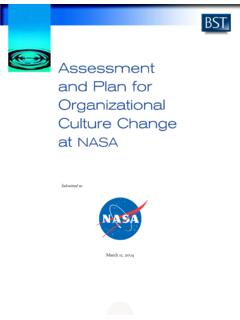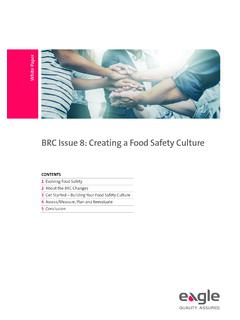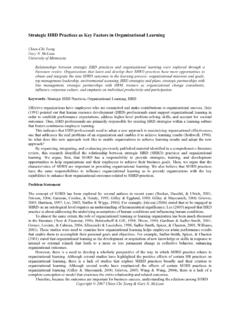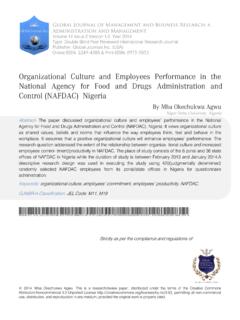Transcription of The Role of Ethics in 21st Century Organizations - ed
1 International Journal of Progressive Education, Volume 15 Number 2, 2019 2019 INASED 167 The Role of Ethics in 21st Century Organizations Jenny E. Grigoropoulosi American Community Schools of Athens Abstract Business Ethics is a highly discussed and debated subject in today s corporate and business world, as well as in educational and academic circles. There are certain parameters, which influence the extensive level and degree to which Ethics has been analyzed by scholars and researchers in recent years, such as globalization, technology, intangible assets, talent management. Meanwhile, Organizations that are inclined in performing according to ethical standards, morals, and values, have recognized the importance and significance that ethical procedures and policies are communicated and practiced throughout the entire organization , while at the same time becoming a priority for the administration of the organization .
2 organizational and educational leadership is responsible for practices such as creating the foundations for the resourceful and ethical performance of the business. It is one of the most powerful and important aspects of human activities in Organizations . Given that leaders are the most influential body in any institution greatly impacting the organizational culture , they are the ones who ought to promote and model principles and values in accordance to the objectives, mission, and vision shared with employees. Although ethos as a principle and value was first discussed in the ancient Greek philosophic circles, where it was characterizing the virtuous and moral beliefs, attitudes, and acts, the importance of the principle of ethical behavior had not been apparent until recent years that individuals and Organizations have been researching to find ways that ethical behavior can be integrated into corporate practices.
3 Moreover, Ethics and the notion of ethical behavior and value systems in the organizational setting have become an organizational precedence in the 21stcentury. While leaders have numerous external factors, which present opportunities and threats, such as keeping up with the technology advancements, globalization s outcomes, threats of the competition, they also have to keep up with internal tasks and practices such as the alignment of mission, vision with the organizational culture , the strategies designed and the goals pursued for their own organization . Although the role of a leader is a complex and multifaceted one, he/she must also integrate ethical practices in their Organizations policies. Keywords: culture , Ethics , leadership, organization DOI: ------------------------------- i Jenny E.
4 Grigoropoulos, , Faculty American Community Schools of Athens, Greece Correspondence: This document downloaded from [2 times] Chesterfield / United States on Fri, 14 Jun 2019 18:02:08 +0300 International Journal of Progressive Education, Volume 15 Number 2, 2019 2019 INASED 168 INTRODUCTION Business Ethics is a highly discussed and debated subject in today s corporate and business world, as well as in educational and academic circles (Brown, Trevino, & Harrison, 2005). In practice, it is the application of ethical values and morals to everyday business processes, behavior, and policies. Ethics is a practice that applies to everyone employed in the organization , regardless of position, level of responsibility, and range of responsibilities (Paliwal, 2006). As Peter F.
5 Drucker (1981) states Ethics is non-negotiable, there is one Ethics . There are morality rules and ethical behavior code that applies to all people alike. Ethical behavior and undertakings relate to actions, which are characterized by honesty, integrity, morality and good management practices (Paliwal, 2006, p. 4), while earning profits for the business organization . There are certain parameters, which influence the extensive level and degree to which Ethics has been analyzed by scholars and researchers in recent years, such as globalization, technology, intangible assets, talent management (Eryaman, 2007; Frynas & Melahi, 2011; Noe, Hollenbeck, Gerhart, & Writght, 2014; Paliwal, 2006, Picciano, 2011). Furthermore, there are factors, which inhibit ethical intentions and behavior such as increasing competition; pressure for profits and return on investment; political corruption; values and morals not considered important by younger generations; the expectancy of fast money and profits; and disregard for social responsibility, honesty, and integrity (Brimmer 2007; Paliwal, 2006).
6 Meanwhile, Organizations that are inclined in performing according to ethical standards, morals and values, have recognized the importance and significance that ethical procedures and policies are communicated and practiced throughout the entire organization , while at the same time becoming a priority for the administration of the organization (Brimmer, 2007). These standards must be modeled and practiced while having the commitment of the administration of the organization . Moreover, there must have been established a formal code of Ethics outlining the policies, regulations, and expectations for all stakeholders. The code of Ethics must be thoroughly communicated throughout the organization in formal an informal ways (written and oral communication) while making sure that there is provision for guidance and support in cases of dilemmas or insecurities.
7 The organization ought to provide a thorough training program to prepare the employees for the policies, practices, and expectations in order to increase employee ethical awareness and to define criteria for ethical decision-making within the organization (Paliwal, 2006, p. 19). Additionally, when designing ethical programs, it is necessary to assign the leading role for the ethical implementation throughout the organization to an Ethics officer who will be undertaking the role of a guide towards ethical decision-making and practices. Moreover, the Ethics officer will be encouraging accountability and ownership towards the ethical program throughout the organization . The Ethics officer ought to design response and enforcement methodologies through the provision of rewards. At last, investigations and provision of consequences in cases of behaviors, which are in non-accordance to the ethical program, must be reinforced by the Ethics officer, while evaluating the program when the need arises for reevaluation and redesigning of sections of the program (Paliwal, 2006).
8 Values are what we choose as worthwhile or believe to have merit in a general or broad sense. Issues of right or wrong are related to one s values. So, values represent a specific mode of conduct or end state of existence is personally or socially preferable to an opposite or converse mode of conduct or end-state of existence. Values are deep-seated ideas and feelings that manifest themselves as behavior or conduct these values. The true reflection of one s values is his/her action (Paliwal, 2006, p. 23). Values are unwavering and enduring. They represent the foundations of a person s character. Moreover, they are the abstract version of what people believe to be right. They guide what actions are proper and meaningful for individuals to pursue. Also, values have intensity which explains how important they are.
9 When an individual experiences his/her values becoming internal, they also become part of his/her character. Moreover, his/her actions become impulsive and constant and intuitive (Hannah, Schaubroeck, & Peng, 2016).The family, the school and the This document downloaded from [2 times] Chesterfield / United States on Fri, 14 Jun 2019 18:02:08 +0300 International Journal of Progressive Education, Volume 15 Number 2, 2019 2019 INASED 169 educational systems he/she attends, recreational activities he/she attends, religion, society and community residing in, form values. From the analysis of values and Ethics above, their significance cannot be overstated. Meanwhile, the implementation of ethical practices and programs in the corporate environment can be challenging. All functions must be included in the design process and policies must be applicable to all employees, with respect to people being hired, fired, as well as respect for and employee privacy.
10 Furthermore, besides the responsibilities that the organization has towards its employees, it is of utmost importance that the employees support their organization , are trustworthy and loyal. In addition to the employees and the administration, there are internal and external stakeholders who affect and are affected by the organization ; thus, they must be considered regarding their interests and welfares when designing the Ethics program s policies, and practices (Paliwal, 2006). Leadership is responsible for practices such as creating the foundations for the resourceful and ethical performance of the business. It is one of the most powerful and important aspects of human activities in Organizations . Companies invest tremendous amounts of funds on training effective leaders given that the long term survival as well as growth of Organizations starts with ethical leadership.


















